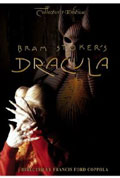
Directed by
Francis Ford Coppola
128 minutes
Rated MA
Reviewed by
Bernard Hemingway

Bram Stoker's Dracula
Francis Ford Coppola’s lavish and erotically-charged retelling of Bram Stoker's novel looks marvellous and it is no surprise that it won Oscars for Costume Design, Make-Up and Sound Effects. It is less successful dramatically, particularly in its latter stages when, after having gone to England in pursuit of Jonathan Harker’s luscious fiancée (played by Winona Ryder), Count Dracula flees to Transylvania with exorcist Professor Van Helsing and a gaggle of cronies in pursuit and the film begins to operate on formulaic Hollywood chase principles and rely upon reiterative vampire movie tropes. Given these stock standard embellishments, why the film is called "Bram Stoker’s Dracula" and not "Francis Ford Coppola’s (and screenwriter James V. Hart’s) Dracula" I am not sure except to garner a legitimacy which it ultimately does not have.
Gary Oldman gives a magnificently mannered portrayal of Nosferatu, originally the Romanian King,Vlad the Impaler, defender of Christianity, who turns against the faith after his wife (Ryder, again) is tricked into killing herself by the perfidious Turks and the Church refuses to give her a Christian burial. After that the film follows fairly faithfully the story as we know it from F.W. Murnau’s 1922 classic Nosferatu, A Symphony Of Horror, before losing its way in the aforesaid pursuit of the undead.
Anthony Hopkins's vampire-hunter Dr. Van Helsing and Tom Waits’ insect-eating Bedlamite give the film a juvenilely sensationalist quality more typical of Spielberg than Coppola, who here demonstrates his flair for the cinematically opulent but whose tendency to excess exhausts our sympathies. And why, other than studio insistence, the tepidly one-dimensional Keanu Reeves was cast as Jonathan Harker and the nearly as insubstantial Winona Ryder as his eventual wife, is a mystery. Both are well-suited to teen movies but here do nothing but create a gaping hole in the fever pitch melodramatics.
Half of of this film is Coppola at his best (he even re-cycles the famous baptism sequence from The Godfather). The other half of it could have been made by any multiplex director.
FYI: Coppola had intended to direct Mary Shelley's Frankenstein (1994) as a companion-piece but for reasons unknown Kenneth Branagh directed it, unfortunately to no good effect.
Want something different?





